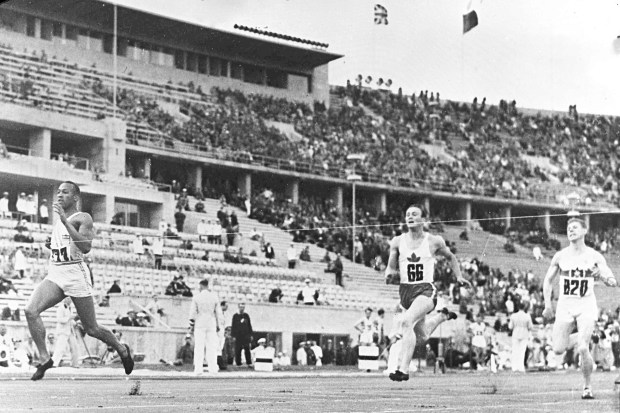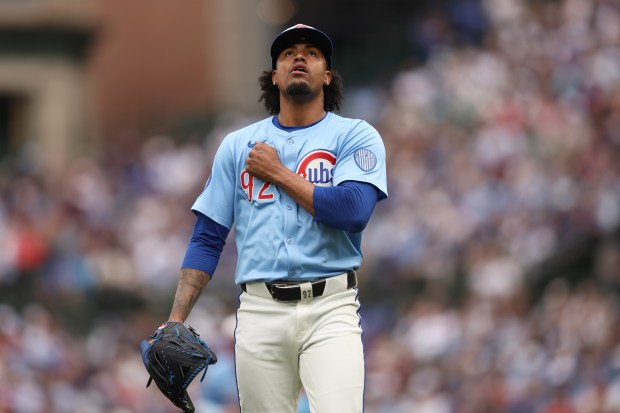Editor’s note: This is Part 3 in a three-part series from Northwestern University professor Ian Hurd and student Sadie Barlow that explores the history and geopolitics of the Olympics. Read Part 1 and 2 here.
The founding myth of the Olympics is that sports bring people together and can bridge political divides. Governments may clash and politicians disagree, but the Games show what is possible when people compete in the Olympic spirit of “friendship, solidarity and fair play” on the playing field.
Like all fantasies, the ideal of world peace through sport has only a slim connection to reality. It has helped the International Olympic Committee become immensely profitable, but it masks the strategic decisions that guide the Olympics, especially in times of war, conflict and authoritarian rule. The Olympics are enmeshed in global politics, though the committee doesn’t like to talk about it.
Geopolitics will be back on the front pages when the Paris Games open amid war in Ukraine and in Gaza. Israel, the Palestinian territories, Ukraine and Russia are all Olympic nations, and their athletes will compete in Paris. The global politics and individual suffering of these two wars presents a sharp dilemma for the IOC: How to advance the spirit of universalism and peace when powerful governments prefer division and war?
Before we look at the answer, consider a similar predicament from almost 100 years ago. The 1936 Olympic Games were scheduled for Germany — the summer in Berlin and the winter in Garmisch-Partenkirchen — and the Olympic Committee knew that Adolf Hitler would use them to legitimize his regime. It was “sportswashing” avant la lettre. Faced with host-city laws against Jews as well as other restrictions that were obviously counter to the Olympic spirit, the IOC decided nevertheless to go ahead with the Games. It was apparently a huge success for both parties. Nazi propaganda director Leni Riefenstahl filmed it, Hitler himself showed up, Black American track star Jesse Owens won four gold medals and the Games were the first to be televised.
The logic behind the IOC decision is revealing. Then-IOC President Henri de Baillet-Latour reasoned that the Games’ nonpolitical position in fact required that the Berlin Games go ahead and precluded any complaining about antisemitism or anything else. If the IOC objected to Nazism, he said, it would be taking a position on politics that would itself be improper. In his view, indifference to the human costs of government policy was integral to the values of Olympism. (A few years later, he led the move to put the 1940 Winter Games in Germany, too, before they were canceled because of war. He was buried in Brussels in 1942 in a coffin draped with a swastika flag.)
Today, similar logic is behind the Olympics’ decisions relating to Russia’s invasion of Ukraine and Israel’s war in Gaza. On the first, the IOC has banned the Russian Olympic Committee from Paris; Russian athletes will compete as individuals without a national affiliation. On the second, it affirmed that the Israeli Olympic teams are welcome in Paris. These seem like opposite decisions, but they are united by the spirit of blind-eye indifference that governed the IOC at Berlin in 1936.
The details are important. The IOC did not punish Russia for invading Ukraine or bombing its cities, and it has not criticized Israel for its destruction of Gaza. It has expelled the Russian Olympic Committee and will force Russians to appear as “independent” in Paris on the grounds that the Russian Olympic Committee tried to incorporate Ukrainian athletes in the territories taken over by Russia. In the eyes of the IOC, the problem with Russia’s behavior isn’t the death and destruction — it is instead the insult to the authority of Ukraine’s national Olympic committee.
Israel has not tried to incorporate Palestinian athletes, though it did kill many of its athletes.
In the eyes of the IOC today, as in 1936, war and mass death are not enough to exclude a nation from the Games.
In all this, the IOC says it is committed to the idea of individual responsibility. It will not punish athletes for the choices of their governments. After all, athletes have little influence over governments, and they may well be reliant on governments for their careers.
This gives a false impression that the IOC is hands-off when it comes to dealing with governments. It is not. For one thing, the IOC has banned Russian athletes “who actively support the war” in Ukraine, which looks a lot like punishing individual athletes for taking a political position. And more generally, the Olympics’ symbiotic relationship with governments means that both stand to gain when they work together. When the Games go well, governments get an influx of people and money and a boost in public profile, and the IOC gets a stable platform for the global spectacle that it sells to advertisers and sponsors.
The IOC today would rather forget 1936 and Baillet-Latour, but it still uses his logic to disavow its own political responsibilities. When pressed about doping at the Sochi Winter Games in 2014, human rights and pollution in Beijing 2008, and corruption and self-dealing in Paris 2024, the IOC deflects and parries. Anti-doping is the responsibility of the World Anti-Doping Agency, it says; labor and environmental law is up to the local government; and building contracts are managed by the host city committee.
When things go wrong, responsibility always seems to lie with someone else.
Ian Hurd is a professor of international politics at Northwestern University. He is the author of “International Organizations.” Sadie Barlow is an undergraduate at Northwestern studying economics and international studies. She is working with Hurd this summer as a research fellow at the Buffett Institute for Global Affairs.
Submit a letter, of no more than 400 words, to the editor here or email letters@chicagotribune.com.





